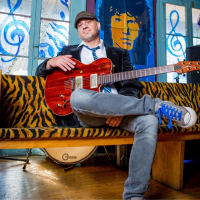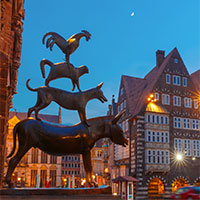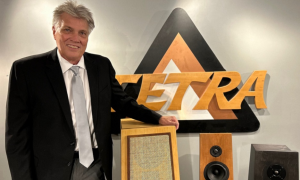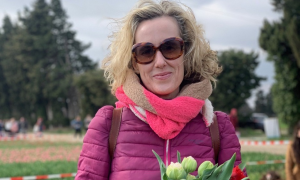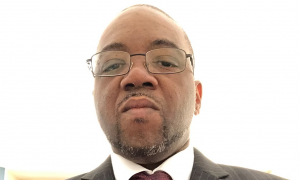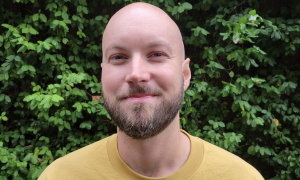Home » Jazz Articles » Chats with Cats » The Conference Producer: Peter Schulze
The Conference Producer: Peter Schulze

Courtesy Frank Pusch
We once had a mission statement saying, 'nothing can replace meeting face to face.' That is still true and is very much the thing about Jazzahead, that people meet there.
—Peter Schulze
About Peter Schulze
Peter Schulze's resume is extensive. Born in 1947, he studied composition and Tonmeister in Berlin, Germany, but soon after began working as the Jazz Editor at Radio Bremen, a public radio station. During his tenure there he produced more than 1600 radio concerts, many of which have been released on record and include the likes of Keith Jarrett, Soft Machine, Peter Brötzmann, Philip Catherine, and Iain Ballamy. From 1998 to 2001 he became the head of the entire music department of Radio Bremen and, in 1975, co-founded the Archive of Popular Music, a publicly accessible archive that holds around 150,000 records and thousands of volumes on popular music. That database can be found at www.kkarchiv.de.He has also worked as an Artistic Director for several jazz festivals including the Bilsak Jazz Festival in Istanbul, Turkey, JazzFest Berlin and Pro Musica Antiqua, a biannual festival of ancient music. Mr. Schulze is currently the Artistic Director for Sendesaal Bremen, a unique concert venue that stages about one hundred concerts per year, and Jazzahead, an annual conference for the jazz industry held in Bremen Germany.
All About Jazz: You studied composition at university, so did you ever pursue a career as a musician or composer?
Peter Schulze: Well, I started studying composition because I had a big band. In the '60s it was impossible to study jazz composition or arrangement, so you had to study classical composition. I'm a clarinetist and started as a jazz player but I had to learn classical clarinet because there were no jazz clarinetists around to teach. That was the classical education that we know here, in a conservatory. In those days it was totally impossible to study jazz.
Now, in Germany, we have eighteen universities where you can study jazz professionally. But I went to the first courses of jazz education in 1962. That was very impressive and formative, but I gave up composition early on because I started working for the radio when I was twenty-three. I took the chair as the Jazz Editor at the public radio station, Radio Bremen. You'll remember from the '50s there was this payola thing going on in the States. Of course corruption is going on in the music business as well and l I did not want to be part of that. I was approached by people from the industry who'd say, "well, you could compose something for us and play our stuff." I did not want to do that at all so I simply stopped composing and just worked as a jazz editor. And, as it turned out, I had to listen to something like 3500 records per year. When you are writing music it's difficult to tell whether something was my own or if it was a reflection of what I just heard.
So, I gave up composition and playing. I was a very decisive and excited radio guy.
AAJ: Yes. You have a vast history of producing radio concerts and jazz festivals. Are there any performances that stand out as some of your favorites?
PS: Of course there are. One that stands out is Keith Jarrett when he recorded his first solo concerts and was issued by ECM. Solo Concerts: Bremen/Lausanne was a three-record set which was totally unknown and totally crazy. The idea of issuing six LP sides of just totally improvised music. I mean at times it might have been five records because there were some other concerts from New York and from Stockholm that were taken into account. But, it ended up to be just Bremen and Lausanne.
That was 1973 and I remember Keith writing the liner notes for this record and he said that as a band member it's easy because you can communicate with the musicians and get inspiration from them, but, what happens when you're alone on stage? Nobody can inspire you. That's where the audience comes in. The audience does not seem to be aware of how important their role is. There is a history of Keith being very sensitive when it comes to noises in the concerts.
That leads me to another point. That was recorded at Sendesaal in Bremen and it's a place I run now as an independent producer and promoter. It's an acoustically fantastic place. I mean, Keith knew where he was playing and he played very well there. Itamar Doari, the Israeli percussion player, says, "as a musician on stage the Sendesaal is wonderful because you can hear the audience listening."
This is a thing that was very important to me. I made my first recordings in that hall in 1961 as a clarinetist and I fell in love with that hall immediately because you're completely in another world once you enter that place. That's what musicians nowadays feel as well. We have around one hundred concerts there per year and loads of recordings. Last year we had 167 days of recording so it's a busy place and very sought after.
It was supposed to be torn down in 2007 and we fought for seven years to keep it from destruction. Finally, we succeeded. The radio abandoned the hall and we took over all of the equipment because they didn't give a shit. We still use it and it's very well kept. It's an important place to be.
Other concerts I produced were John Abercrombie, Al Jarreau, and Tom Waits. They've all been there on their very first European tours. Tom Waits came in 1978 and nobody knew him over here. He's an amazing performer. He came here with a quartet and we still keep that on the radio. It was never issued on record.
So was Al Jarreau. He came to Europe for the first time in 1976. Also Pat Metheny, by the way. I just saw him two weeks ago when he was performing in Bremen. And I produced a concert there at the Rathaus, "the Mayor's House," a place built in 1653, very ancient stuff. Pat had just joined Gary Burton's quintet and that was his first appearance in Europe ever. I mean he came from the Midwest and a place that is not very well educated. He came into a historical house in Germany from the 17th century and performed there. This was just killer for him [laughs]. He still speaks about that nowadays.
We had a lot of people that played here early in their careers and we recorded them. That's something because we were the poorest radio station in Germany and still is. By the way, it was founded by the Americans in 1945. Bremerhaven was an American enclave and our street signs even say "A.E." for "American Enclave." So, they founded this radio station and financed it in 1952 and financed this venue as well. It's still a fantastic one. It's a very early example of a "box within a box" building and brilliant sounding.
AAJ: Very interesting. And, I'm a guitarist so I'm a huge Pat Metheny fan.
PS: He was nineteen then. The next day I called Manfred Eicher, who was a good friend of mine, and I said, "check out this guitarist." He said, "I just made a record with him." That was Bright Size Life.
AAJ: Amazing. Of course, one of your many duties is being a Co-Artistic Director of Jazzahead. What is the mission of that?
PS: We started that in 2005 and 2006 was the first edition. It was a crazy idea of the CEO of the fairgrounds in Bremen. He once called me and said, "I'm Peter Schneider, the new fair director and I want to do something with jazz. I talked to people in town and they all said you should call Peter Shulze. Why should I call you?" I thought that was a smart opening to call somebody and say, "why should I call you?"
We had a coffee and exchanged ideas. He was serious about making a fair on the topic of jazz. There was IAJE, of course, but that was mostly jazz education. He wanted a fair that was across the industry and had everything from instrument makers, to labels, to festivals, to whatever had a link to jazz.
We started that in 2006 and he included Ulrich Beckerhoff as the second guy. We had known each other since 1965. He was a trumpet player and played in my big band when we were very young. So, we became Co-Artisitc Directors of Jazzahead. Uli comes more from the high school and university side and I come more from the media and radio side
The first edition had eighty exhibitors and eight hundred people attending. the concerts. In 2019 we had 3500 professional participants from sixty-seven countries all over the world. Ever since IAJE folded in 2009, more and more Americans have come as well. Between 2006 and 2010 it was more or less European countries that participated. Ever since 2010, more and more people from all over the world come.
AAJ: Do you think that it was important for the European jazz scene to have something like this of their own?
PS: I don't think so. We never wanted to exclude anyone. We did not want to just make it a national thing for Germany but to make it more European. That was our mission to make it more international and, after IAJE was over, to get it worldwide.
I think it's important because big fairs like Popkomm or APAP tend to be very impersonal and very much down to business. This is down to business as well but the jazz scene is very diverse and doesn't involve too many people worldwide. So, it's small enough to make personal connections.
Many people come and say, "well, I met this guy I only knew from email, or from the phone, or from letters, or whatever." That's normal. We once had a mission statement saying, "nothing can replace meeting face to face." That is still true and is very much the thing about Jazzahead that people meet there. Meeting is more important than many topics. At times we even left out panels because the urge to communicate directly was so big that people were always talking and did not attend the seminars.
This is a very important point that the CEO had predicted. He said that when people are happy to meet each other, this is the most important thing because they would let other people know and bring them along next year. This is how it works. People come for the first time as a participant, do their own business and think, "well, maybe next time I'll come back as an exhibitor," or maybe they have a band they want to showcase there.
We have forty showcases each edition. We started with eight German showcases, sixteen European showcases and, since 2011, we have a partner country showcase which includes eight bands from that country. And, since 2011, we also have an overseas night which included eight bands from "overseas" as we call it. But that just means anything from beyond Europe. There doesn't have to have an ocean in between.
That includes bands from Brazil to South Africa to Malaysia, or anywhere. The showcases are all jury-driven. We have different juries for every module which consist of festival directors or club programmers because we think those are the people who have the most interest in music and they are the ones that have to buy these bands and get them in their festivals. There are no musicians or journalists in the juries, just program makers from all over the world. We have around 800 applications per year and forty slots so it's very selective.
AAJ: How do you think participants, in particular musicians, could make the best use of their time there?
PS: We have speed meetings which is a great networking event. If you are a musician and you register at Jazzahead as a professional participant, then you get the names of all the participants, and you can get in touch with each of them. We have a platform called Talque and, through that, you can connect with all of the participants. Of course, some of the festival makers try to hide [laughs] because they are approached most but you can find a label there as well. This is how many label deals came into being. And juries always find interesting bands.
For example, Uli and I are always on two juries each. I think it was in 2016 or 2017, I was on the overseas part along with seven festival directors and everybody voted unanimously for a band that nobody knew, FatsO, from Columbia. They had never played outside of Columbia and it was their first time in Europe ever. From their showcase they were engaged to play seventeen international festivals worldwide. This is not the rule but it happens.
AAJ: You recently included a hybrid model with an online edition, how has that worked out?
PS: Two years ago it was totally canceled because of Covid. Last year we had a totally digital version which was crazy in a way because we had a huge venue due to Covid, a 14,000-seat venue, and hoped to get something like 1500 people in there under Covid conditions. Well, as a matter of fact, we got nobody because it was not allowed so we did a totally digital version.
That was good because we could really try this Talque platform for communication and we used that this year in the hybrid version as well. You cannot really listen to all forty showcases but we record them with professional video quality and you can still watch them until the end of June. You can see all the showcases, all the panels, and all the discussions as well so that you can really dive deeper into what you missed on site.
That is the upside of the hybrid version but we did not have that many people that only connected digitally. We had 2700 professional participants which is a lot after two years of nothing. It was a crazy situation this year because nobody knew how many people would show up. For how many people do you prepare for? How many people can travel these days? I mean, China still had a lockdown and Covid was vibrating through the whole thing. So, everyone was just lucky to attend and meet.
That is a very important point of that fair, for people to meet. If it were a pop meeting it would be too big but the jazz meeting is still cozy even if you have 3,500 people there because you know it will not be that many more. Many musicians come and make their first connections with labels and festivals. You meet all these people there and, if you can convince them, you can get a deal. Simple as that. But in no other place in the world is there such a gathering of jazz industry people as in Bremen. We're excited about the whole thing.
AAJ: It sounds like you're optimistic about it which leads me to my next question. What is your assessment of the current and, maybe future, state of the jazz industry?
PS: It's difficult to say because right now so many concerts were canceled or postponed and it will be difficult to recover. I think that is the case for the whole industry and in other parts of the world it's even worse. I think conditions are very difficult. How will the monetization happen in the future?
We have to be optimistic because we do believe that entertainment and life experience as a listener and as a player are not replaceable. There's a lot of things on the net and you get that for free. I think the overexposure of concerts was really dramatic with all the live transmissions and live recordings. Everyone tries to find a good position and to be in front but the problem with that is, the cheaper you make it, the more people you reach. But, how do musicians survive then?
On the other hand, if you give everything for free, it devalues the content. That is something we all have to fight with and find a solution. We, for example, did some live streams as well but they were paid streams because it's not understandable why musicians should not be paid for their work as well as the technicians.
But, at the moment, it does not pay off. It's no model for a scene as small as the jazz scene to monetize. Of course there are the big shots which rely on bands, orchestras, or artists with big followings on social media. That helps feed itself in a way. There are platforms like Dreamstage that only present bands with over a million followers. So, that is easy for them to promote because the bands do the work themselves.
I think the paid streams is a model that could work but only in regards to a big following. In jazz there are no followings of that size and it might not work as a model unless there is some support from foundations, or the state, or companies to cover these costs. In Germany, due to Covid, we have support called Neustart Kultur or, "new start to culture," that is well equipped financially for this year and, hopefully, for the first half of next year. But, nobody can tell what will come after.
I hope that, until then, the recovery of the live scene works so well that people come back to the concerts. But people say here, "the sofas have too much glue." People tend to stay at home whether it's laziness or fear of Covid, the shift in what people do has changed dramatically. But, we still have to make sure that live entertainment does not get caught under the wheels.
AAJ: This is my last question for you. You clearly have done so much within the industry, I'm wondering if there's anything you would still like to do or accomplish.
PS: Well, I'm 75 now and I'm just about to leave some things in younger hands because I feel that all this social media is not really my cup of tea. I'm not good at that. So, if people are good at that they should take over. I say that without any anger or fear. I mean, I've worked a lot in my life and always enjoyed working in my field. I worked for the radio for more than thirty years and did thousands of transmissions as a moderator and thousands of recordings as a producer and we always had the freedom to do what we wanted to do. That is just great.
We rode a long history of popular music and made hundreds of transmissions that people were so interested in during the '70s and '80s, they called in for the manuscripts. We always sent out like six hundred manuscripts every week to listeners around Bremen. We thought that we should publish that and did that under Bear Family Records which is a reissue label in Germany. They put that out as a fifty-two CD set with a 320 page book accompanying it. So, it's a labor of love as well. From these transmissions we started an archive of popular music that we still own now with 150,000 records in stock and 20,000 books
AAJ: Wow, that's a lot.
PS: Yea, it's a research center now.
AAJ: So, you feel you've done all that you've wanted?
PS: Yes, there is not too much left. I would now like to rest a bit. I did the Artistic Director of Sendesaal job as a voluntary thing but it's a full time job. At 75 you don't get lazy and you don't get annoyed by it all but I think, well, enough is enough.
I'm totally fine with that and I don't think I have that fear of losing meaning as a person when you don't have that exposure that we used to have in the media. I can retire in peace and think, "well, it's other people's turn."
AAJ: Job well done.
PS: Thank you.
Tags
Chats with Cats
B.D. Lenz
Germany
Bremen
pat metheny
Keith Jarrett
Soft Machine
Peter Brotzmann
Philip Catherine
Al Jarreau
Tom Waits
JazzAhead!
FatsO
PREVIOUS / NEXT
Support All About Jazz
 All About Jazz has been a pillar of jazz since 1995, championing it as an art form and, more importantly, supporting the musicians who make it. Our enduring commitment has made "AAJ" one of the most culturally important websites of its kind, read by hundreds of thousands of fans, musicians and industry figures every month.
All About Jazz has been a pillar of jazz since 1995, championing it as an art form and, more importantly, supporting the musicians who make it. Our enduring commitment has made "AAJ" one of the most culturally important websites of its kind, read by hundreds of thousands of fans, musicians and industry figures every month.

